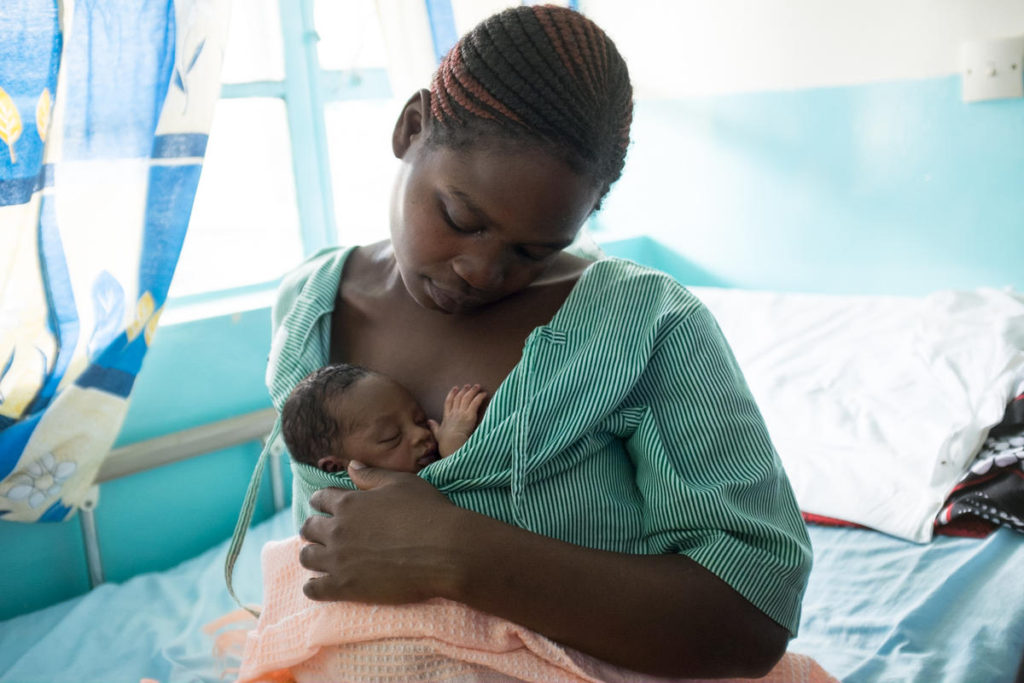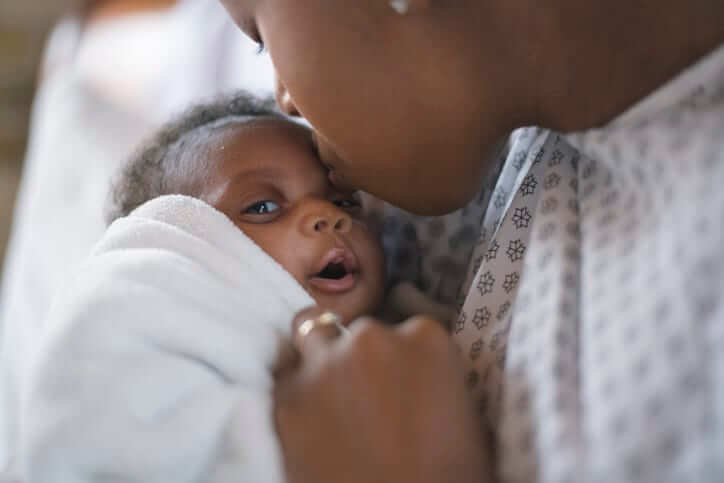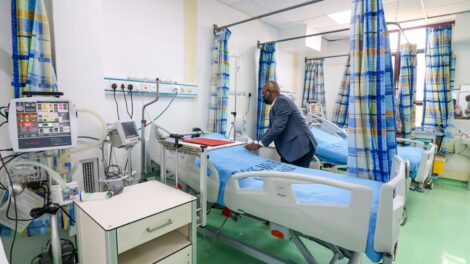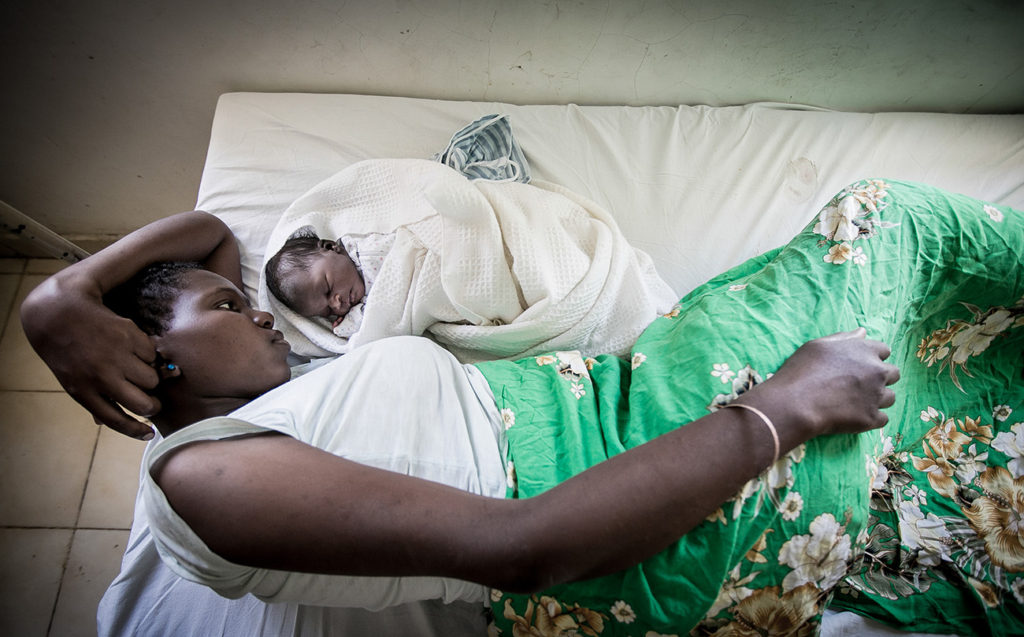Twenty five year old Purity Awuor was terrified when she found out she was pregnant for the
third time in 2020. Daunting memories of her giving birth at Pumwani Hospital made her
rethink- whether to repeat another risky childbirth or terminate the pregnancy.
Despite her fears, Awuor decided to keep the baby, weighing against the high risk of opting for
abortion in a common Kenyan healthcare system. Her story is a stark reminder of the dangers
faced by women in Kenya during childbirth, where maternal mortality rates remain stubbornly
high.

In the confines of her two-bedroom apartment in Kayole, Awuor vividly narrates her birthing
experience. She recalls mockery and misbehavior from the hospital staff and also recounts that
she was left to bleed profusely for over half an hour decrying for emergency assistance.
“The maternity ward was a chaotic nightmare- a cramped space overflowing with agonizing
screams of other patients,” said Awuor. “ I was forced to share a single bed with up to four
others, crammed together with no space to move.”
She was referred to the Pumwani hospital for an emergency C-section- while the nurses here had
just palpated her stomach and put her in a long queue. The procedure was postponed for two days
later, leaving Awuor in excruciating pain and anxiety.

The next day, Awuor witnessed in horror as a mother gave birth on her own- while the nurses
around were busy scrolling their phones, chatting, and having tea.
“ I was in despair, I wondered if I awaited the same. As the clock struck noon, my worst fears
were to become reality,” said Awuor. She had begun sweating profusely and upon examination, a
nurse informed her she was showing signs of labor. She had been booked for a C-section, and no
one had bothered to explain what to expect if she went into labor naturally. As her back pain
slowly intensified, she came to the realization that the baby was not waiting for the scheduled
C-section. By five in the evening, the pain was excruciating, while Awuor was crawling the
corridors of the maternity ward, begging nurses to examine her.
All her efforts in vain, she lay on her bed, bleeding and in pain- as someone yelled to the nurses
claiming to see the baby’s head. Following Awuor’s delivery without assistance, the nurse cut the
umbilical cord, wrapped the baby, and left Awuor alone in a delivery mess as she was bleeding
profusely. Awuor was later diagnosed with anemia and had to undergo a blood transfusion.
According to WHO, postpartum hemorrhage (excessive bleeding after childbirth) is one of the
leading causes of maternal deaths worldwide, accounting for over 25 percent of deaths each year.
In Kenya, it is the leading cause of maternal mortality, accounting for 34 percent of maternal
deaths.
Obstetric Violence a Widespread issue
Obstetric violence against women is on the rise in Nairobi and other rural communities in Kenya,
and Awuor is one of the many victims. Although the exact number of affected women is
unknown, mounting research has brought attention to this alarming issue. A study published by
BMC Reproductive Health revealed that women in Kenya face various forms of abuse,
discrimination, and negligence during childbirth, including physical and verbal abuse, as well as
other violent acts.

Interviews with nurses and doctors in the study also uncovered that violent and abusive
behavior was commonplace among medical staff. The study found that nurses had been trained
to be tough with women and justified their actions as necessary to force compliance with their
instructions. The medical staff frequently described women as “rude,” ‘difficult”, or “uncooperative”.
More recent research from the same journal focused on the mistreatment of women during
childbirth in a peri-urban setting in Kenya. It found that some women suffered physical abuse,
including physical violence by healthcare workers, in larger maternity facilities. One woman
recounted an incident where a nurse had pulled out a woman’s stitches and slapped her thighs,
leaving her to suffer without painkillers for the rest of the day.
Aside from physical abuse, women also reported being denied a birth companion, neglected and
abandoned during labor and delivery, and refused essential birthing items such as bathing water
and food. Longer waiting times for services, such as scheduled cesarean sections are also
common-with women waiting for hours without explanation, even after the number of patients
had subsided.
While a 2020 report published by Natba Health which focused on a case study of Naivasha, a
sub-county mainly occupied by the Maasai community and located about 92.8 km northwest of
Nairobi highlighted an increase in maternal mortality rates in Kenya driven by low quality
maternal care. The report said some women delivered on the hospital floors unattended while
some had to take help from fellow pregnant women to help them deliver.
Gender-based violence or professional deficiency
A 33-year-old Kenyan female nurse, on condition of anonymity, shared her experiences with
disrespectful maternal care in private and public hospitals. She revealed that harsh treatment
towards women in childbirth has become the norm, particularly towards those who are
uncooperative during delivery.
“Usually, during childbirth, we tend to be tough on women who are not cooperating, – it is for the
safety of the child,” she said. The nurse emphasized that it is often difficult to differentiate
between violence against women and doctors being harsh in a supportive manner. “The first-timers, uneducated, and those overly-informed and unwilling to deviate from their birth plan are
at higher risk of experiencing disrespect during childbirth,” she added.

David Rimui Kamau, a clinical officer at St. Mary’s Medical Center in Wangige said that
understaffing and poor remuneration are contributing factors to the incidence of obstetric
violence in health facilities. “You find one nurse taking care of so many patients with long
working hours. Poor and delayed payment add to the frustrations,” said Kamau.
Another major factor Milton Allah, a clinician at Kenyatta University Teaching Referral and
Research Hospital stresses is how mentally unstable mothers are particularly vulnerable to
obstetric violence. “These mothers may not have the ability to communicate their needs or
understand what is happening to them during childbirth, making them easy targets for abusive
medical staff,” said Allah. “Many women refuse to be treated by female medical officers without
considering the experience and qualifications.”, leading to friction between the patient and the
caretaker.
The majority of Kenyan mothers go through disrespectful maternity care (obstetric violence) which is
also a form of gender-based violence and has been prohibited in Kenya since 2014, when the
the country ratified the National Policy for Prevention and Response to discourage any kind of
violence against women. In addition, the Kenyan constitution under Article 38 recognizes the
rights of women’s dignity, respect, and protection from all forms of violence, including physical,
and emotional abuse.While Article 43 recognizes the right of every person to the highest
attainable standard of health, which includes protection from all forms of violence.
The World Health Organization (WHO) declares obstetric violence as abuse of women during
pregnancy, childbirth, and the postpartum period. The UN health agency recognizes that such
treatment not only violates the rights of women to respectful care but can also threaten their
rights to life, health, bodily integrity, and freedom from discrimination.
Awareness Priority
In June 2021, the Kenyan government released a policy brief titled, “Kenya’s Roadmap to
advancing gender equality, ending all Forms of gender-based violence and female genital
mutilation by 2026.” This policy proposal was an intervention against systematic barriers which
encouraged gender-based violence (GBV). Despite this policy, Kenya has experienced a surge in
GBV, including obstetric violence and FGM, especially during the COVID-19 pandemic.
According to data from the Kenya Demographic and Health Survey (KDHS), more than 40% of
women in the country have been subjected to physical or sexual intimate partner violence at
some point in their lives. The prevalence of child marriage and female genital mutilation (FGM)
is also significant, with rates of approximately 23% and 21%, respectively.

Kenyan women lack knowledge and awareness of women’s rights, particularly with regard to
sexual education and reproductive health rights. “ I wanted to report the mistreatment but I didn’t
know what was legal or illegal,” said Awuor.
According to Anne Mugo, a gender equity advocate based in Nairobi and ONE Campaign
champion, lack of awareness of patients’ rights and African cultural taboos around childbirth
have exacerbated obstetric violence, leaving violated women ashamed and voiceless. “Women
cannot report abuse during childbirth if they do not know where to report it. The majority are unaware
of their rights to be treated with dignity.” said Mugo.
Surging maternal death
The consequences of obstetric violence are dire and can include health complications, inhumane
childbirth, and even death due to neglect. Kenya, in particular, has struggled with a high maternal
death rate which has been a major challenge.
Currently, Kenya’s maternal mortality ratio is estimated at 362 per 100,000 live births. While
statistics show a decline in maternal deaths in Kenya over the years, the country is still far from
reaching SDG Target 3.1, which aims to reduce maternal deaths to less than 70 deaths per
100,000 live births by 2030, with no country having more than twice the global average. The
impact of these deaths goes beyond numbers, as it affects families, communities, and the nation
as a whole. Around 355 males become widowers while some children never get to meet their
birth mothers, causing a devastating impact on families and communities.

To address this issue, Kenya implemented the Free Maternity Policy (FMP) in 2013, which aims
to provide free maternal care services to all pregnant women. This policy has resulted in an
increase in the number of women giving birth in maternity care facilities rather than with
traditional birth attendants at home. However, there are still challenges in the implementation of
this policy, with reports of neglect, abuse, and lack of quality maternal care contributing to
women’s reluctance to attend facility care services.
Survivors of obstetric violence are at risk of getting fistula, which is one of the most serious and
tragic childbirth injuries. The United Nations Population Fund reports that obstetric fistula leaves
women and girls leaking urine, feces, or both, often leading to chronic medical problems,
depression, social isolation, and deepening poverty. When Awuor was stitched by the doctor, the
doctor told her, “You are lucky, if you took longer without medical help, you would have gotten
obstetric fistula”. In Kenya, approximately 3,000 women and girls develop fistula every year,
while the number of those living with untreated fistula is estimated to be between 30,000 and
300,000.
Need for clear laws and actions
Researchers and health activists are working towards achieving respectful maternity care, not
just as a vision for the future, but as the bare minimum that should be accessible to every woman,
everywhere.
Leshan Kereto, a Kenyan sexual health expert and chairperson of the United Nations Populations
Fund (UNFPA) Youth Advisory Panel, appeals to the government to empower women and
remove the barriers that enable such violations to thrive. “Hearing from women who have
experienced this abuse gives a clear picture of where we stand,” said Kereto. “There is also a
lack of clear laws criminalizing these incidents of violence against these vulnerable women,” she
said, adding that inclusion of the term “obstetric violence” to the legal system would be a
necessary step towards curbing these frequent incidents.
